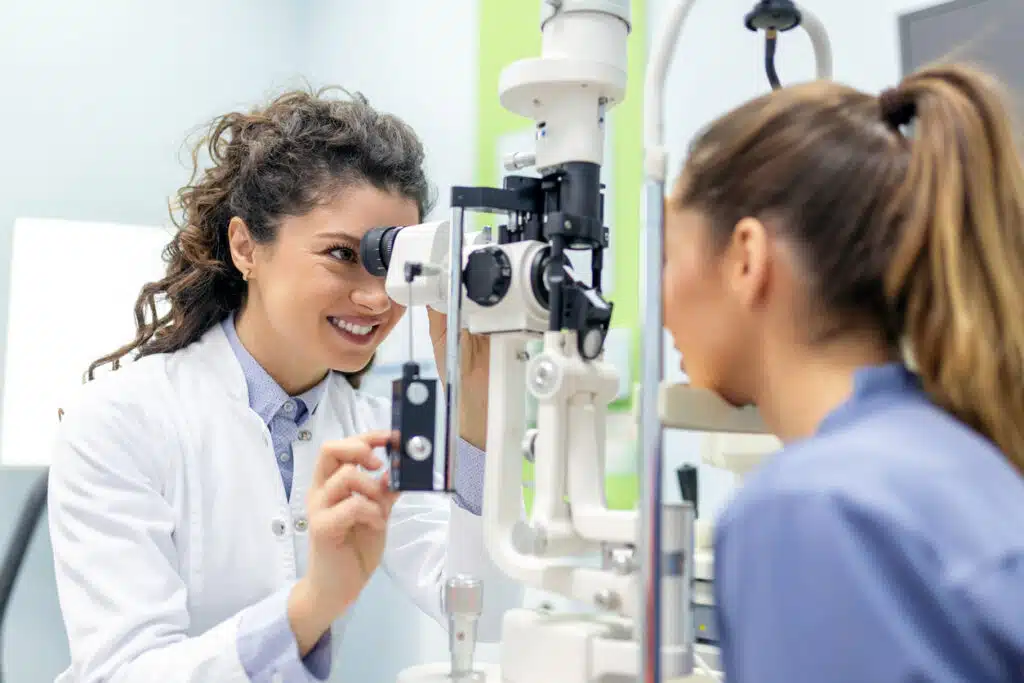
A cataract is when the natural lens inside the eye becomes cloudy. This happens gradually, thickening the lens until it becomes so cloudy that light is distorted or can’t pass through to the retina (the back of the eye), which sends visual signals to the brain. If left untreated, cataracts can eventually cause blindness. Advanced technology lenses (multi-focal and accommodating lenses) are now available and can reduce your need for glasses after cataract surgery!
Symptoms of Cataracts
If you have or are developing a cataract, you may notice symptoms like cloudy or blurred vision and may feel the need to change your eyeglasses. You might also struggle to see clearly in dim light, such as while driving at night. Colors may appear faded, and you may experience glare, halos around lights, light sensitivity, and a gradual decrease in vision. These symptoms are common for those with a cataract. If you have any of these, please let your eye doctor know during your exam.
A cataract is when the natural lens inside the eye becomes cloudy. This happens gradually, thickening the lens until it becomes so cloudy that light is distorted or can’t pass through to the retina (the back of the eye), which sends visual signals to the brain. If left untreated, cataracts can eventually cause blindness. Advanced technology lenses (multi-focal and accommodating lenses) are now available and can reduce your need for glasses after cataract surgery!
Symptoms of Cataracts
If you have or are developing a cataract, you may notice symptoms like cloudy or blurred vision and may feel the need to change your eyeglasses. You might also struggle to see clearly in dim light, such as while driving at night. Colors may appear faded, and you may experience glare, halos around lights, light sensitivity, and a gradual decrease in vision. These symptoms are common for those with a cataract. If you have any of these, please let your eye doctor know during your exam.
About Cataract Surgery
In cataract surgery, the cloudy lens is removed and replaced with a clear, permanent lens implant (IOL) to restore vision. Among seniors and baby boomers, it is one of the safest, most effective, and common surgeries in the U.S., with over 2.5 million procedures done each year. At Dadar Eye Physicians & Surgeons, our cataract surgeon, Dr. Bhavesh J. Gohil, typically performs cataract and lens implant surgery on an outpatient basis, offering a convenient and comfortable same-day procedure.
The Cataract Surgery Procedure
Before surgery, your eye will be treated with drops to dilate the pupil and anesthetic drops to numb the surface of your eye, so you feel minimal discomfort. You may also receive medication to help you relax, if desired. The whole procedure usually takes less than 30 minutes and is comfortable.
About Lens Implants
During your pre-surgery exam, Dr. Bhavesh J. Gohil and the staff will discuss the best lens implant options for you. Various implants can correct vision for distance, mid-range, and up close, such as the AcrySof® ReSTOR® Multifocal Lens, AcrySof® IQ PanOptix™, TECNIS Symfony® Extended Depth of Focus IOL, Crystalens® AO IOL, and toric lenses for astigmatism correction like the AcrySof® Toric, Trulign Toric IOL, or TECNIS Toric Lens. These options can help reduce your reliance on glasses after surgery. We will answer all your questions to ensure you feel at ease on the day of your surgery.
We will schedule a follow-up within 24 hours of your surgery to check your healing progress and ensure your vision is as expected. You’ll receive eye drops and a protective shield to wear at night to prevent accidental rubbing. Most patients recover quickly, with many resuming daily activities within a day or so after surgery with Dr. Bhavesh J. Gohil at Dadar Eye Physicians & Surgeons.
